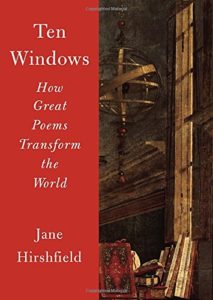
Poetry, the poet and essayist Jane Hirshfield reminds us, was born in need. “We read or write poems because we need them, ” she writes in Ten Windows: How Great Poems Transform the World. “The first poems were work songs, love songs, war songs, lullabies, prayers—rituals meant to carry assistance.”
Hirshfield is the author of eight poetry collections: Alaya (1982); Of Gravity & Angels (1988); The October Palace (1994); The Lives of the Heart (1997); Given Sugar, Given Salt (2001); After (2006); Come, Thief (2011); and The Beauty (2105). She is also a poetry translator, editor of anthologies, and the author of Nine Gates: Entering the Mind of Poetry (1997) and other collections of essays. She’s received enough recognitions and honors to fill two or three articles; see her entry at the Poetry Foundation.
 It was coincidence that I was reading Hirshfield’s Ten Windows at the time of the election. Published in 2015, the book is a collection of ten essays on poetry. The subtitle, “How Great Poems Transform the World, ” is somewhat misleading; the essays do not directly address that subject. Indirectly, however, they do. The essays are just subtler about it.
It was coincidence that I was reading Hirshfield’s Ten Windows at the time of the election. Published in 2015, the book is a collection of ten essays on poetry. The subtitle, “How Great Poems Transform the World, ” is somewhat misleading; the essays do not directly address that subject. Indirectly, however, they do. The essays are just subtler about it.
Like poetry.
In times of great change—political, social, economic—we turn to poetry to make sense of what seems nonsensical, to comfort, to explain. Like much of life, poetry moves through movements, fashion, and fad. But also like life, poetry has somehow managed to outlive the transient. The poet Edward Hirsch has pointed out that no civilization has ever existed without it. Poetry is a basic part of the human experience, and it’s been with us from the very beginning.
Hirshfield’s topics may seem familiar: looking through poetry’s eyes, the language of poetry, an introduction to the Japanese poet Basho and haiku, poetry and uncertainty, poetry and paradox, and others. Perhaps doubly coincidentally, I was reading the essay “Poetry and the Constellation of Surprise” the evening of the presidential election.
This essay was never intended to be a primer or commentary on the 2016 presidential election. But it was a strange experience to have been reading it while flipping back and forth between the election coverage on Fox and CNN. (It was also a strange experience flipping back and forth between these two antitheses of network news.)
She begins the essay with an anonymous poem, “Western Wind, ” which she says is one of the oldest poems in English literature.
Western wind, when wilt thou blow?
The small rain down can rain?
Christ, that my love were in my arms,
And I in my bed again.
Election night was a night of surprises. “In poetry, ” Hirshfield says, “surprise deepens, gathers, and purifies attention: the mind of preconception is stopped, to allow a more acute taking-in.” And surprise is one way that poetry “transforms the world.” It changes us who read it; it changes our individual selves as we absorb it and understand it and our collective selves as we share it, recite it, talk about it, and write about it.

Jane Hirshfield
Poetry is a communal enterprise. It was undoubtedly spoken before it was written; the word was originally vocal long before it became writing. Poetry is written (and read) by both “winners” and “losers.” It is as just as important to each to understand what change has happened, what upheaval has occurred, what has been gained, and what has been lost.
The essay in Ten Windows after the one on surprise is (another coincidence at election time?) “What is American in Modern American Poetry.” Hirshfield points to Walt Whitman as the fount for modern American poetry, and I believe she’s right. But she also notes that what feels “American” to us is not the same as what feels “modern.” And she says this: The hallmarks of American art are the hallmarks of a culture created by immigration, by mobility of psyche and of body, by the invention required when finding yourself removed from traditional terrain, answers, and ways.”
We came as strangers in a strange land, and we had to constantly invent and reinvent ourselves to survive and then to succeed. That’s what underlies our culture, our history, and our lives. Poetry is a well that explains that.
Photo by Julian Tyson, Creative Commons, via Flickr. Post by Glynn Young, author of the novels Dancing Priest and A Light Shining, and Poetry at Work.
__________________________

“I require all our incoming poetry students—in the MFA I direct—to buy and read this book.”
—Jeanetta Calhoun Mish
- “Your Accent! You Can’t Be from New Orleans!” - October 9, 2025
- Poets and Poems: Donna Vorreyer and “Unrivered” - October 7, 2025
- Poet Sidney Lanier and the Lost Cause - October 2, 2025
Bethany R. says
“Poetry is a well that explains that.” Excellent point and post. Reading it clarified for me how helpful poetry is for us as individuals and as a community.
Rick Maxson says
An interesting juxtaposition, Hirshfield’s quote on surprises, and election night. No matter what vote we made, I think we were all surprised.
Sandra Heska King is busy now committing Eliot’s The Love Song of J. Alfred Prufrock to memory. What a surprise the opening lines of that poem must have been at the time.
And when we are learning language as babies, we must have been surprised at every turn.
I am almost finished with Jane Hirshfield’s “Nine Gates.” I have “Ten Windows.” Now I can’t wait to begin reading it.